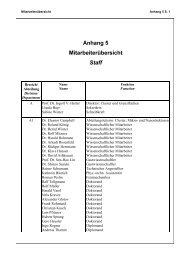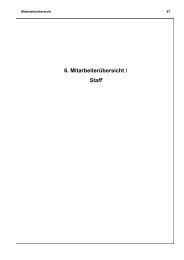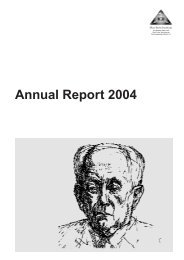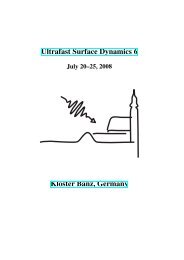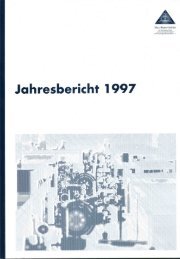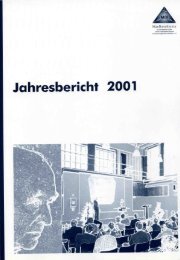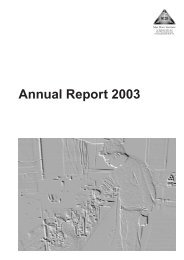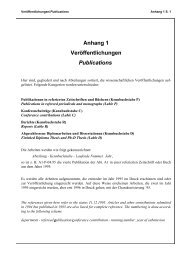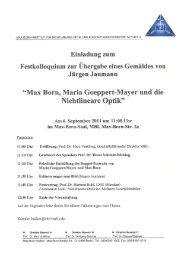Create successful ePaper yourself
Turn your PDF publications into a flip-book with our unique Google optimized e-Paper software.
always remained<br />
50<br />
<strong>Max</strong> <strong>Born</strong> • Paul Corkum<br />
a dilettante<br />
Heisenberg, who had already received the Nobel Prize in 1933 – on his own – regretted this<br />
omission in a letter to <strong>Born</strong>: “I find the fact that I alone received the Nobel Prize for work that<br />
we did together in Göttingen – you, Jordan and me – very upsetting ...” He at least tries to<br />
make <strong>Born</strong> stand out from the group of scientists when he continues: “I also believe that all<br />
good physicists know how great your contribution ... to the construction of quantum physics<br />
was – and that cannot be changed by an incorrect assessment of the situation by outsiders.”<br />
As in other cases, the way the Nobel Committee reaches its decisions remains hidden from outsiders<br />
– and this is right and proper. At the time the decision on the Nobel Prize was taken,<br />
however, Heisenberg had undertaken other important work: the uncertainty principles originated<br />
in 1927, the work on ferromagnetism in 1928, and on nuclear physics and isospin in 1932.<br />
I believe that in retrospect we must also consider that the mid – twenties was an enormously<br />
productive time for scientific work thus making the decisions on the Nobel Prizes awarded in<br />
the mid – thirties very difficult. At that time there simply weren’t enough prizes to properly<br />
honour all the fundamental work that had been done.<br />
In any case, Pauli was right when he wrote to <strong>Max</strong> <strong>Born</strong>: “I am certain that the statistical character<br />
of the natural laws – on which you insisted from the very beginning in spite of Schrödinger’s<br />
resistance – will determine the style of the laws for several centuries at least.”<br />
<strong>Born</strong>’s circle during his time in Frankfurt and Göttingen included, in addition to Stern, Heisenberg<br />
and Wolfgang Pauli as his assistants, also his PhD students Pasqual Jordan, Friedrich<br />
Hund, <strong>Max</strong> Delbrück, Maria Göppert – Mayer, Robert Oppenheimer and Victor Weißkopf, as well<br />
as John von Neumann, Edward Teller and Eugen Wigner as permanent guests; five of whom<br />
later became Nobel laureates. <strong>Max</strong> <strong>Born</strong> was an enthusiastic and charismatic researcher and<br />
an exemplary teacher, a reference point for his students in professional and human terms.<br />
But <strong>Max</strong> <strong>Born</strong> was more than this, he was a role model due to his wide range of interests. At<br />
that time, and especially today when there are hyperfigures for every conceivable activity ranging<br />
from brilliant scientists and gifted engineers, through actors, stars of classical and modern<br />
music, writers and philosophers, up to sports stars, there is more than ever a need to encourage<br />
people to develop various aspects of their personalities.<br />
A concern with the interesting aspects of the world does not mean breaking some extroverted<br />
record or another but in the first instance enriching one’s own, very personal experience of life.<br />
In his “My Life & My Views” <strong>Max</strong> <strong>Born</strong> writes: “I never wanted to be a specialist”, and he refers<br />
to the fact that in the original sense of the word a “dilettante” is a person who enjoys something,<br />
and he continues, “and [I] always remained a dilettante myself even in those fields that



